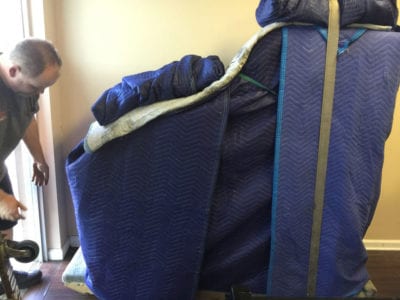 Moving and storing a piano can be a tall task. Even when using professional movers, there is great risk that something happens to the piano. There are just so many things that can go wrong with moving a piano- from issues with the pedal system to moving parts of the piano. It is worth the investment to go with quality piano movers and equipment when it comes to relocating your favorite instrument. Reducing the risk of something going wrong is usually worth the peace of mind.
Moving and storing a piano can be a tall task. Even when using professional movers, there is great risk that something happens to the piano. There are just so many things that can go wrong with moving a piano- from issues with the pedal system to moving parts of the piano. It is worth the investment to go with quality piano movers and equipment when it comes to relocating your favorite instrument. Reducing the risk of something going wrong is usually worth the peace of mind.
There have been many cases where people have been burned by trying to use cheap movers to move their piano. When they open the case they find their worst dreams come true.
In order to safely move your piano across town or around the country, you should look for dedicated professional piano movers (yes, they do exist). They may charge a premium over your typical mover, but they will put in the care and attention necessary to take care of the piano and all of its intricacies. A professional will know how to appropriately disassemble your piano and package it in a way that minimizes the risk of anything going wrong. From there, they will use quality moving services to get it form location A to location B. Pianos can be especially heavy and these movers are used to dealing with that as well as other logistical issues that come with moving the hefty instruments.
Other things that you want to consider when your piano is being moved include the construct material of the instrument as well as the storage conditions when it is in transit. When it comes to wood pianos, the temperature and humidity are especially important to keep an eye on. When it comes to deciding where to put the piano in the new location, consider everything from the conditions which will help keep it in pristine condition to the actual playing experience and what locations will allow for optimal play and musical experience (accounting for things like how sound travels within the space, etc.) Light around pianos can be especially nice, so long as there is not excessive heat due to the window space, which may damage the piano.
Parents who have kids just learning the piano may want to insulate some of that sound by putting the instrument in a garage or basement. The important thing to remember in this instance is that the place should not be damaging to the instrument.
Once you figure out the optimal place for everyone who will be affected, it is time to reassemble the piano! This is where a professional comes in extra help again because they will include the reassembly in the process and will make sure that the job is done in the way it should be. A good piano tuner should also be involved in the process so that they can tune the piano once it is moved (since the process can really get it out of tune). Moving a piano can be a big deal, so it is worth going with a quality mover.
Image credit: www.davespianoshowroom.com